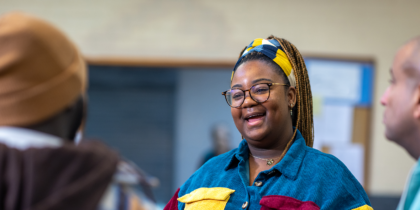There’s not much my GP doesn’t know about me. She knows my blood pressure and cholesterol levels. She knows my height, my weight, whether I smoke and even how often I drink alcohol.
She knows these things because they’re crucial to my future health.
But there’s one thing my GP doesn’t know. Because she’s never asked. And it’s not a subject I’m likely to raise myself.
She doesn’t know whether I’m lonely.
Loneliness is also crucial to my future health. Research shows that long-term loneliness leads to a 26% greater odds of early death, along with much higher risk of illness such as heart disease, stroke, dementia, depression and anxiety.
Loneliness is also associated with significantly higher health care costs, even when demographic, economic and lifestyle factors are taken into account. Local work to tackle loneliness has been shown to reduce emergency hospital admissions.
If my GP raised the issue and found that I was lonely, then she could do something about it. She could refer me to a social prescriber, who in turn could help me access a wide range of community activities in my local area. It wouldn’t take long and would surely be a good use of her time.
Of course, I can already hear the accusations that I’m ‘over-medicalising’ things. And there I go, dumping everything at the door of my overworked GP again! Surely it should be for someone else to identify my loneliness? But who? My employer? Well maybe, but they haven’t asked either. And do you really think I’m going to talk to my boss about such a private matter?
Or what about my friends? Well yes, despite being lonely, I may well have a group of friends. But if I could talk to them about it then maybe I wouldn’t be lonely.
The fact is that primary care is where the impact of my loneliness is most likely to emerge. And the Royal College of General Practitioners (RCGP) agree with me:
“All too often, GPs are the only human contact which chronically lonely patients have. Three out of four GPs say they see between one and five people a day who have come in mainly because they are lonely. These moments of meaningful connection matter.”
This isn’t just a job for primary care. As the RCGP points out, there needs to be a combined effort from other system partners to ensure that accessible opportunities for meaningful social contact are maintained in the community.
This in turn requires local authorities, the voluntary sector and a range of other partners to work together to ensure the sustainability of community initiatives, as well as inspiring new initiatives in areas where they may be limited. This work should obviously be coproduced with local communities and driven by their ideas, preferences and expertise.
A good example is the Worcestershire Public Health “We are Westlands” Programme, which saw funding devolved to a local partnership of residents and community partners in a deprived area. This local partnership used the funding to start or expand a range of community initiatives that subsequently had a measurable, positive impact on health and wellbeing outcomes.
The recent neighbourhood health guidelines issued to the NHS provide an excellent conduit for work on loneliness. The guidelines set out what local systems should do to deliver on the ambition of providing more care outside of hospitals, built around the needs of patients.
The guidelines are explicit about an ambition to create “healthier communities” and the importance of social prescribing within integrated neighbourhood teams. Loneliness is mentioned specifically as a driver of demand, and the guidelines explain how a neighbourhood health approach can…
“…enhance the partnership between councils, local public agencies like job centres, the third sector and NHS partners, and design much clearer pathways for non-medical support from the local public and third sectors.”
The evidence is clear. Local systems that address loneliness as a central theme within their neighbourhood health approach will certainly see the value of doing so. Health across the population will improve, demand on services will reduce and communities will be strengthened.
But before health professionals can do anything about loneliness, we need to find the time to raise the matter with patients. It’s not always easy, as stigma around loneliness can so easily lead to a “don’t ask, don’t tell” approach to the issue.
However, if we can pluck up the courage to ask patients if they feel lonely, it may be the most impactful and beneficial conversation we ever have with them.






